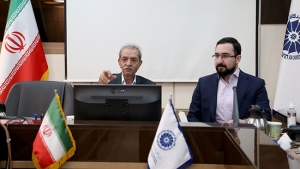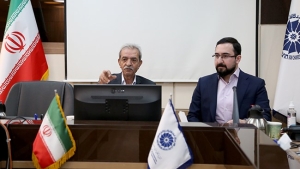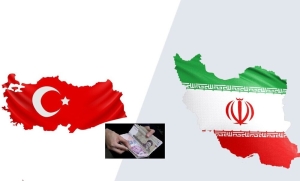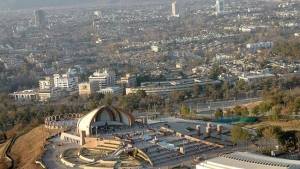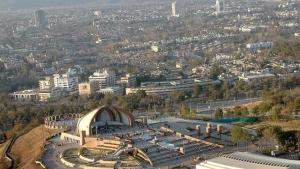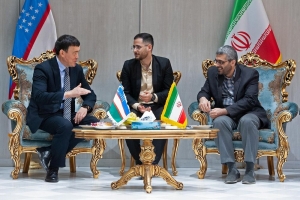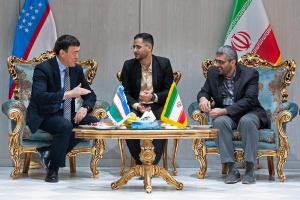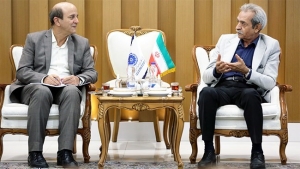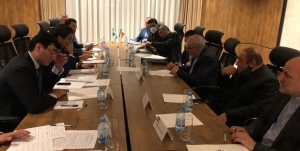Member Countries
ecocci
Iran private sector calls for facilitating business visa issuance among ECO member states
President of Iran Chamber of Commerce, Industries, Mines, and Agriculture Gholam Hossein Shafei on Tuesday urged ECO member states to facilitate visa issuance for businesspersons from other member countries.
Shafei made the remarks during an online meeting of presidents of the Chambers of Commerce of ECO member countries.
The meeting was also participated by the presidents and vice-presidents of Chamber of Commerce of Pakistan, Azerbaijan, Afghanistan, Kyrgyzstan, Kazakhstan, Turkmenistan, and Uzbekistan. ECO Secretary General Khusrav Noziri was also present in the meeting.
Shafei, who also heads ECO Chamber of Commerce and Industry (ECO CCI), said that ECO is located in an intersection linking East-West and North-East corridors.
He noted that implementation of different corridors will undoubtedly cut the time and cost of transit and will also lead to a subsequent boost in trade and economic cooperation among ECO member countries.
He regretted that the volume of trade among ECO member states is too low, noting that the statistics suggest that the bloc has had as much as $927 billion of trade with the world in 2021 while an only 8.1% of the amount was the share of intra-regional trade.
He also said that the foreign direct investment (FDI) among the ECO member countries accounted for just 1.7% of the bloc’s total FDI inflow in 2021 which is much disappointing.
President of Iran Chamber of Commerce, Industries, Mines, and Agriculture (ICCIMA) Gholam Hossein Shafei (L) and ICCIMA Deputy for International Affairs Alireza Yavari are seen in an online meeting of presidents of the Chambers of Commerce of ECO member countries October 4, 2022.
Shafei called for implementation of a 2003 ECO Trade Agreement (ECOTA) and turning it into a free trade agreement
The Iran Chamber of Commerce president also said that launching direct flights, linking power grids and creating an ECO electricity market, as well as oil and gas swap activities can help the development of cooperation among ECO member states.
He also called on representatives from the member Chambers of Commerce and Industry to report existing problems in the area of trade, investment, visa, transit and transportation, and banking so as to be addressed in the ECO secretariat in Tehran.
Iran private sector calls for facilitating business visa issuance among ECO member states
President of Iran Chamber of Commerce, Industries, Mines, and Agriculture Gholam Hossein Shafei on Tuesday urged ECO member states to facilitate visa issuance for businesspersons from other member countries.
Shafei made the remarks during an online meeting of presidents of the Chambers of Commerce of ECO member countries.
The meeting was also participated by the presidents and vice-presidents of Chamber of Commerce of Pakistan, Azerbaijan, Afghanistan, Kyrgyzstan, Kazakhstan, Turkmenistan, and Uzbekistan. ECO Secretary General Khusrav Noziri was also present in the meeting.
Shafei, who also heads ECO Chamber of Commerce and Industry (ECO CCI), said that ECO is located in an intersection linking East-West and North-East corridors.
He noted that implementation of different corridors will undoubtedly cut the time and cost of transit and will also lead to a subsequent boost in trade and economic cooperation among ECO member countries.
He regretted that the volume of trade among ECO member states is too low, noting that the statistics suggest that the bloc has had as much as $927 billion of trade with the world in 2021 while an only 8.1% of the amount was the share of intra-regional trade.
He also said that the foreign direct investment (FDI) among the ECO member countries accounted for just 1.7% of the bloc’s total FDI inflow in 2021 which is much disappointing.
President of Iran Chamber of Commerce, Industries, Mines, and Agriculture (ICCIMA) Gholam Hossein Shafei (L) and ICCIMA Deputy for International Affairs Alireza Yavari are seen in an online meeting of presidents of the Chambers of Commerce of ECO member countries October 4, 2022.
Shafei called for implementation of a 2003 ECO Trade Agreement (ECOTA) and turning it into a free trade agreement
The Iran Chamber of Commerce president also said that launching direct flights, linking power grids and creating an ECO electricity market, as well as oil and gas swap activities can help the development of cooperation among ECO member states.
He also called on representatives from the member Chambers of Commerce and Industry to report existing problems in the area of trade, investment, visa, transit and transportation, and banking so as to be addressed in the ECO secretariat in Tehran.
Exports to Turkey increases 49% in 8 months
TEHRAN - The value of Iran’s exports to neighboring Turkey increased by 49 percent to reach $2.382 billion in the first eight months of 2022, according to the figures recently released by the Turkish Statistical Institute.
Iran had exported $1.592 billion worth of goods to Turkey in the previous year’s first eight months, the mentioned data showed.
During the said period, the total trade between Iran and Turkey increased by 29 percent to $4.332 billion, up from $3.344 billion in January-August 2021.
Based on the mentioned data, Iran’s imports from the country also marked an 11-percent rise to hit $1.950 billion during the January-August period, in comparison with the same time span in 2021.
The two countries’ trade balance in the first eight months of 2022 was $432 million in favor of Iran.
According to the Turkish Statistical Institute, the country exported $248 million worth of goods to Iran in August, while the imports from the Islamic Republic stood at $237 million in the mentioned month.
Turkey's exports to Iran grew by 1.2 percent this month and imports from the Islamic Republic increased 10 percent compared to the same month last year.
Increasing non-oil exports to neighboring countries is one of the major plans that the Iranian government has been pursuing in recent years.
Having 543 kilometers of shared border with Iran, Turkey is among the country’s top trading partners.
Earlier in July, high-ranking officials from the two countries discussed ways of expanding economic relations along with political ties in a Turkish-Iranian High-Level Cooperation Council in Tehran.
During the meeting, which was co-chaired by Iranian President Ebrahim Raisi and Turkish President Recep Tayyip Erdogan, the two sides stressed the need for taking new measures for the expansion of trade ties.
The value of Iran’s exports to Turkey increased by 61 percent to reach $1.904 billion in the first half of 2022.
The trade between the two countries had also increased by 37 percent to $3.365 billion, up from $2.448 billion during the same period a year earlier.
Iranian trade delegation due in Pakistan within a month
A delegation of Iranian private sector activists is scheduled to visit neighboring Pakistan on October 25.
The Iranian delegation is said to be headed by President of Iran Chamber of Commerce, Industries, Mines, and Agriculture (ICCIMA) Gholam Hossein Shafei.
During their five-day stay in Pakistan, the Iranian delegation will visit the cities of Karachi and Lahore.
Apart from private sector activists, representatives from the Iranian government will also attend the delegation.
The delegation will be comprised of businesspersons active in different areas including, food and agriculture, oil and gas, petrochemicals, constructional and mining products, pharmaceutical and medical equipment, knowledge-based technology and transportation.
President of Iran Chamber of Commerce Gholam Hossein Shafei said late in February that there is no exact tariff mechanism for trade between Iran and Pakistan.
Shafei, who was speaking during a meeting in Tehran with President of Lahore Chamber of Commerce and Industry Mian Nauman Kabir, urged the need for the private sectors of both countries to press for finalizing and implementing a free trade mechanism.
Both Shafei and Nauman Kabir called for introducing a barter trade mechanism between Iran and Pakistan.
Iranian trade delegation due in Pakistan within a month
A delegation of Iranian private sector activists is scheduled to visit neighboring Pakistan on October 25.
The Iranian delegation is said to be headed by President of Iran Chamber of Commerce, Industries, Mines, and Agriculture (ICCIMA) Gholam Hossein Shafei.
During their five-day stay in Pakistan, the Iranian delegation will visit the cities of Karachi and Lahore.
Apart from private sector activists, representatives from the Iranian government will also attend the delegation.
The delegation will be comprised of businesspersons active in different areas including, food and agriculture, oil and gas, petrochemicals, constructional and mining products, pharmaceutical and medical equipment, knowledge-based technology and transportation.
President of Iran Chamber of Commerce Gholam Hossein Shafei said late in February that there is no exact tariff mechanism for trade between Iran and Pakistan.
Shafei, who was speaking during a meeting in Tehran with President of Lahore Chamber of Commerce and Industry Mian Nauman Kabir, urged the need for the private sectors of both countries to press for finalizing and implementing a free trade mechanism.
Both Shafei and Nauman Kabir called for introducing a barter trade mechanism between Iran and Pakistan.
Tehran, Tashkent make initial agreement to boost oil products, petrochemicals trade
TEHRAN- Iran and Uzbekistan made an initial agreement for the increase in oil products and petrochemicals trade between the two countries.
The agreement was made during a meeting between Iran’s deputy oil minister and Uzbekistan’s deputy energy minister on the sidelines of Iran Plats International Exhibition in Tehran on Saturday.
In general, it is expected that a new chapter in the relations between the two countries in the field of energy and petrochemicals will be opened in the future due to the knowledge of the two sides of each other's capabilities.
Iran and Uzbekistan had also signed a memorandum of understanding (MOU) on cooperation in different energy sectors on September 18.
The MOU was signed by Iran’s Oil Minister Javad Oji and Uzbekistan’s Acting Energy Minister Azim Ahmed Khojayev on the sidelines of the 22nd Shanghai Cooperation Organization (SCO) summit in Uzbekistan.
In this meeting, the high-ranking delegations of Iran and Uzbekistan discussed joint implementation of petrochemical projects in Iran, conducting geological and exploration activities in the field of oil and gas, supply of Iranian petrochemical products in Uzbekistan, exchange of crude oil and petroleum products, and joint research for the development and commercialization of catalysts and chemicals for petrochemical plants.
Providing financial aid and supporting banking cooperation for the development of oil, gas and petrochemical industries in both countries, providing equipment needed by the oil and gas industry, cooperation in the field of creating and providing laboratory equipment and exchange of knowledge in the field of oil and gas industries, as well as the training of skilled manpower in the oil industry were also agreed upon.
Tehran, Tashkent make initial agreement to boost oil products, petrochemicals trade
TEHRAN- Iran and Uzbekistan made an initial agreement for the increase in oil products and petrochemicals trade between the two countries.
The agreement was made during a meeting between Iran’s deputy oil minister and Uzbekistan’s deputy energy minister on the sidelines of Iran Plats International Exhibition in Tehran on Saturday.
In general, it is expected that a new chapter in the relations between the two countries in the field of energy and petrochemicals will be opened in the future due to the knowledge of the two sides of each other's capabilities.
Iran and Uzbekistan had also signed a memorandum of understanding (MOU) on cooperation in different energy sectors on September 18.
The MOU was signed by Iran’s Oil Minister Javad Oji and Uzbekistan’s Acting Energy Minister Azim Ahmed Khojayev on the sidelines of the 22nd Shanghai Cooperation Organization (SCO) summit in Uzbekistan.
In this meeting, the high-ranking delegations of Iran and Uzbekistan discussed joint implementation of petrochemical projects in Iran, conducting geological and exploration activities in the field of oil and gas, supply of Iranian petrochemical products in Uzbekistan, exchange of crude oil and petroleum products, and joint research for the development and commercialization of catalysts and chemicals for petrochemical plants.
Providing financial aid and supporting banking cooperation for the development of oil, gas and petrochemical industries in both countries, providing equipment needed by the oil and gas industry, cooperation in the field of creating and providing laboratory equipment and exchange of knowledge in the field of oil and gas industries, as well as the training of skilled manpower in the oil industry were also agreed upon.
Iran Chamber of Commerce urges further economic cooperation among ECO member states
President of Iran Chamber of Commerce Gholam-Hossein Shafei on Tuesday underlined the need for ECO member states to further rely on the potentials of each other and move towards joint investment.
Shafei made the remarks during a meeting in Tehran with President of ECO Science Foundation (ECOSF) Komail Tayebi.
Also speaking during the meeting, Tayebi said that as an inter-governmental scientific institute, the ECO Science Foundation aims to link the scientific sectors of the member countries with their economic sectors.
“We can use other models on this route like that of ASEAN,” he said.
The ECO Science Foundation is pursuing skill training plans and has had good cooperation with China and Pakistan in this regard, Tayebi said, adding that the foundation also needs the help of Iran Chamber of Commerce.
In the meantime, the Iran Chamber of Commerce president said that Iran’s biggest economic problem today is scientific poverty in economy.
He said that the history of cooperation among ECO member states is so much disappointing.
The amount of inter-group exchanges between the ECO members does not go beyond 10% of their total trade while the number of agreements is much high, Shafei said.
He noted that ECO member states have to identify the potentials of each other and take steps to bring the existing agreements into practice.
Iran, Uzbekistan ink MOU on energy co-op
TEHRAN- Iran and Uzbekistan signed a memorandum of understanding (MOU) on cooperation in different energy sectors, Fars news agency reported on Sunday.
As reported, the MOU was signed by Iran’s Oil Minister Javad Oji and Uzbekistan’s Acting Energy Minister Azim Ahmed Khojayev on the sidelines of the 22nd Shanghai Cooperation Organization (SCO) summit in Uzbekistan.
In this meeting, the high-ranking delegations of Iran and Uzbekistan discussed joint implementation of petrochemical projects in Iran, conducting geological and exploration activities in the field of oil and gas, supply of Iranian petrochemical products in Uzbekistan, exchange of crude oil and petroleum products, and joint research for the development and commercialization of catalysts and chemicals for petrochemical plants.
Providing financial aid and supporting banking cooperation for the development of oil, gas and petrochemical industries in both countries, providing equipment needed by the oil and gas industry, cooperation in the field of creating and providing laboratory equipment and exchange of knowledge in the field of oil and gas industries, as well as the training of skilled manpower in the oil industry were also agreed upon.
Iran, Uzbekistan ink MOU on energy co-op
TEHRAN- Iran and Uzbekistan signed a memorandum of understanding (MOU) on cooperation in different energy sectors, Fars news agency reported on Sunday.
As reported, the MOU was signed by Iran’s Oil Minister Javad Oji and Uzbekistan’s Acting Energy Minister Azim Ahmed Khojayev on the sidelines of the 22nd Shanghai Cooperation Organization (SCO) summit in Uzbekistan.
In this meeting, the high-ranking delegations of Iran and Uzbekistan discussed joint implementation of petrochemical projects in Iran, conducting geological and exploration activities in the field of oil and gas, supply of Iranian petrochemical products in Uzbekistan, exchange of crude oil and petroleum products, and joint research for the development and commercialization of catalysts and chemicals for petrochemical plants.
Providing financial aid and supporting banking cooperation for the development of oil, gas and petrochemical industries in both countries, providing equipment needed by the oil and gas industry, cooperation in the field of creating and providing laboratory equipment and exchange of knowledge in the field of oil and gas industries, as well as the training of skilled manpower in the oil industry were also agreed upon.











